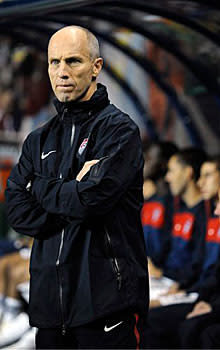Gold Cup loss was final nail for Bradley

Two years of walking the tightrope finally came to an end for Bob Bradley on Thursday when he was fired as United States men's soccer head coach.
Bradley was never a universally popular choice as the leader of the U.S. men's national team, with a large segment of the American soccer community pining for a big-name foreign coach.
Despite some notable high points and a 43-25-12 record, the stoic 53-year-old was never able to produce the signature moment that would have warmed the public to him in greater numbers and secured himself some long-term job security.
Yahoo! Sports wrote during the CONCACAF Gold Cup last month that Bradley would realistically have to lead his team to victory in the competition to hang on to his job, and so it proved.
"We want to thank Bob Bradley for his service and dedication to U.S. Soccer during the past five years," said U.S. Soccer president Sunil Gulati in a statement on Thursday. "During his time as the head coach of our men's national team he led the team to a number of accomplishments, but we felt now was the right time for us to make a change."
Bradley was in trouble once Gulati refused to address the coaching issue when questioned by me and other reporters less than an hour after the USA's 4-2 defeat to Mexico in the Gold Cup final at the Rose Bowl.
Bradley deserves some level of sympathy. He operated under a dark cloud for much of his tenure, as it was no secret Gulati would have preferred to hire Juergen Klinsmann, the former Germany coach, after the 2006 World Cup.
[Related: Who could be Team USA's next coach?]
However, in fairness to Gulati, he made the terms of the job crystal clear. Rightly or wrongly, he expects a team that can challenge for places in the latter stages of a World Cup. Once he lost confidence in Bradley's ability to deliver that ahead of the 2014 tournament in Brazil, it was time to make a change.
Bradley had some strong moments, no doubt about it. Taking the team to the final of the Confederations Cup in 2009, where it beat world No. 1 Spain and took a 2-0 lead on Brazil before losing in the final, was a significant achievement and kept the doubters at bay for a while.
However, he was probably just a minute away from getting fired at the World Cup last summer before Landon Donovan's last-minute goal against Algeria propelled the team into the knockout round and earned Bradley a stay of execution – even though the run through the tournament came to an abrupt end against Ghana.
Yet this summer was always going to be a test for him. With the U.S. and Mexico the two standout teams in the CONCACAF region, a Gold Cup tournament on home soil left Bradley with much to lose and little to gain.
A 4-0 hammering at the hands of Spain in an exhibition was hardly the ideal way to lead into the campaign. Once it was followed by the embarrassment of a group play defeat to Panama, there was only going to be one way for Bradley to stick around.
That would have been by beating Mexico, with its array of rising stars, in the final in front of a strongly pro-Mexican crowd. When the Americans went up 2-0 – thanks in no small part to Freddy Adu, who Bradley had started in a shock move – it looked as if it could be a memorable afternoon for the USA. Instead, Mexico turned the game on its head and totally dominated from that point on.
[Related: News surprises midfielder Clint Dempsey]
It should be remembered that Bradley took over the U.S. in January 2007 after one of the bleakest World Cups in its recent history. Bruce Arena's 2006 team had floundered desperately in Germany, managing just a single point in group play. Bradley improved upon that, but the indications were that things were beginning to stagnate in this new cycle and that the transition from an aging squad to a fresh wave was proving troublesome.
In reality, Bradley's reserved personality did little to help him. A likeable man, his paranoia regarding the media was unfortunate, while criticism of nepotism toward his son Michael – a regular starter in midfield – was both unfair and unfounded. It was, however, a useful stick to beat him with for those determined to do so.
Criticisms of Bradley were that his formations were a little rigid, a somewhat defensive mindset that was good at handling the attacking threat of top teams but limited in terms of creativity. A propensity to give up early goals in big games was critical; it happened three out of four times at the World Cup last year.
In the end, Bob Bradley had to keep winning to keep himself in the job. When he and his team couldn't, his days were numbered.
Other popular stories on Yahoo! Sports:
• All-time free-agent bust Albert Haynesworth has second chance
• Baseball throw so bad it hits on-deck batter
• America's favorite athlete-owned restaurants
• Sign up for Fantasy Football
